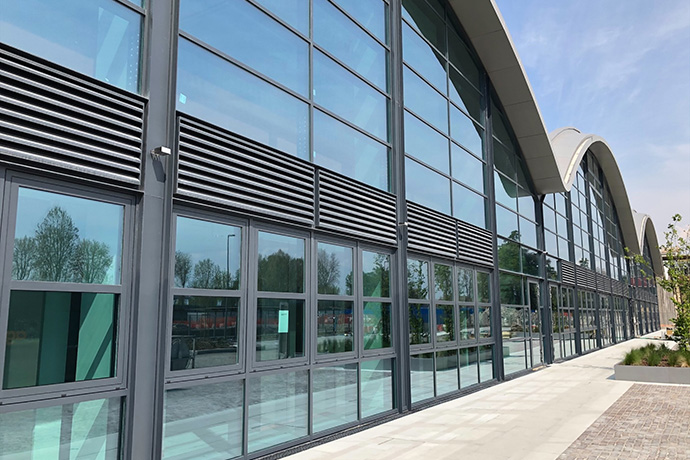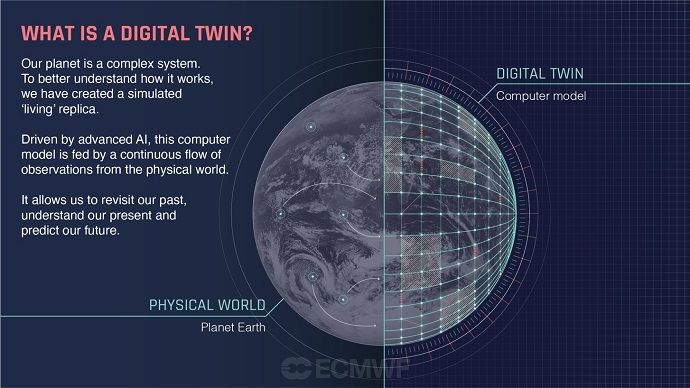

ECMWF will hold its traditional high-performance computing (HPC) workshop this year as an online event entitled ‘Towards Exascale Computing in Numerical Weather Prediction’ from 20 to 24 September.
This year marks the 19th edition of the biennial workshop. As is now customary, it will bring together experts from across national weather services, academia and industry to discuss and share experiences on the use of high-performance computing for operational meteorological applications.
The online format of this workshop was chosen as the best and safest for all attendees and speakers in times of the ongoing COVID-19 pandemic. The workshop programme will consist of overview talks, expert presentations as well as panel discussions. We are aiming to make the workshop an interactive and exciting online experience for our community around the world. The opening of ECMWF’s new high-performance computing facility in Bologna, Italy, is to be marked via a virtual broadcast.
The programme will focus on the current challenges of using HPC in meteorology. It will include topics such as porting weather and climate applications to heterogeneous architectures, scalability and performance optimisation of weather and climate codes, emerging HPC technologies, machine learning, the potential of cloud computing for operational meteorological applications, and the emergence of digital twins of the Earth.

The new ECMWF data centre in Bologna.
Towards exascale computing
A particular focus of this year’s workshop will be on the characteristics and types of hardware architectures that will be present in exascale machines. Participants will examine the challenges and means by which these can be exploited in climate and weather applications, and in particular in operational forecasting models.
In the next few years, systems that are capable of performing in excess of 1 ExaFLOPS (1018 floating point operations per second) in HPL (High-Performance Linpack) will become a reality. These systems are likely to be based on heterogenous, accelerated, and modular architectures, combining traditional HPC technologies, artificial intelligence (AI) and data centric computing.
Most of today’s applications, such as operational weather forecasting and climate models, are still far off exploiting the potential of such systems, and a comprehensive approach to redesigning workflows, codes and algorithms is needed.
This adaption will not only consist of code optimisations to target architectural features of the underlying hardware, but will also encompass an increased effort towards the co-design of the application with the hardware.
Understanding the importance of co-design and the challenges that we will face in adapting our codes to exascale machines will be covered extensively in this year’s workshop. It will also look at experiences of porting parts or the entirety of a forecasting model to accelerators, such as graphical processing units (GPUs) or vector engine processors.
Whether achieving performance portability across architectures is possible with today’s programming models or requires other technologies, such as Domain Specific Languages (DSLs) or source-to-source translators, is not yet the subject of consensus in the weather and climate community. If not providing a definite answer in this year’s workshop, we hope to enable fruitful discussions and debate.

Among the topics of the event will be a session on high-resolution digital models of the Earth, such as the digital twins being developed in the EU’s Destination Earth programme.
Other highlights
Other prominent themes of this year’s workshop include:
- Scalability and performance optimisation of weather applications. Talks will cover reduced precision for climate and weather applications, overlapping computation and communication, optimisation of I/O patterns, and system level tuning.
- The high-performance computing industry. Vendors will talk about emerging high-performance computing technologies and their respective roadmaps towards exascale computing and beyond.
- Machine learning for weather and climate. How can machine learning be introduced into the operational numerical weather prediction workflow, and what is the potential impact on computational efficiency and portability?
- Extremely high-resolution digital models of the Earth. Simulating natural and human activity in order to predict extreme natural events, with a special session on the EC-funded Destination Earth (DestinE) programme and other similar international efforts.
- The EuroHPC initiative. The first stage of this initiative will lead to the procurement and deployment of three pre-exascale supercomputers hosted at CSC, CINECA and the Barcelona Supercomputing Center (BSC). The workshop will host talks from representatives of each of these three centres.
- Cloud computing for operational meteorological applications. For this year’s workshop, we invite talks from practitioners and experts to present the challenges and opportunities that cloud computing presents for operational weather centres.
Outlook to future workshops series
The ECMWF ‘Workshop on the Use of HPC in Meteorology’ will continue to take place in the autumn of every second year, alternating with NCAR’s ‘International Computing for the Atmospheric Sciences Symposium’. Following this year’s exceptional online-only event, the workshop series is expected to resume with face-to-face workshops that will be complemented by virtual events. Watch out for pre-announcements of the NCAR iCAS Symposium 2022 in Stresa, Italy, and the 2023 ECMWF HPC Workshop.
Registration and abstract submission
If you wish to attend the 2021 workshop, you can do so by completing the registration form. Moreover, we are seeking abstract submissions for 20–30 minute oral presentations. Contributions should focus on the above key topics.
If you wish to submit an abstract, please complete the abstract submission form on the workshop page.
